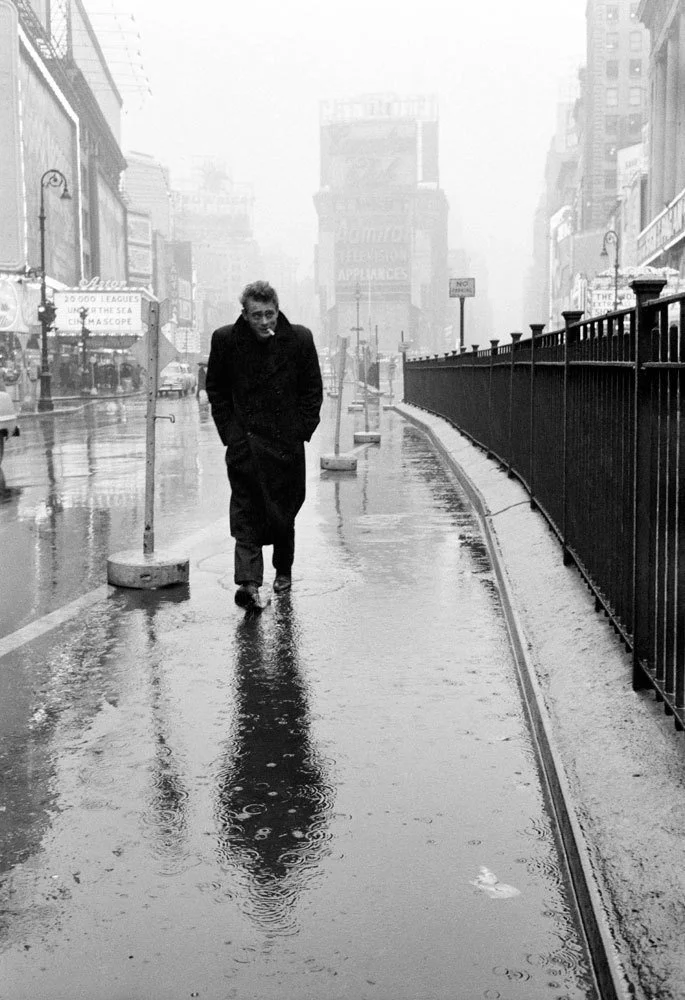JAMES DEAN: THE IMMORTAL REBEL OF HOLLYWOOD
James Dean, a name that resonates in the history of cinema as the prototype of the young rebel, is a legend whose brief life left an indelible mark on popular culture. Born on February 8, 1931, in Marion, Indiana, into a family marked by pain and tragedy, James Byron Dean never imagined that his name would endure in the collective memory long after his premature death. Dean's life was a succession of internal struggles, overflowing ambitions, and a constant fight to find his place in a world that never fully understood him.
From a young age, Dean lived an emotional whirlwind. At the age of 9, his mother, Mildred, passed away from cancer, an event that would leave an indelible mark on his life. The separation from his mother was only the beginning of a complex and solitary journey, as after her death, his father, Winton Dean, moved to California for work, leaving him in the care of his aunt on the Indiana farm. During those years in the countryside, James experienced a sense of abandonment and orphanhood that would deeply affect him, both in his personal life and his future career. In this environment, he found comfort in the arts: in his teenage years, he excelled in disciplines such as dance and violin, and later, when his life brought him back to California, he decided to study drama, a field where he could express himself and find his voice.
Despite his concerns and the insecurity that accompanied him during his formative years, Dean never stopped fighting for his dream of becoming an actor. His arrival in Los Angeles was an act of courage and determination. Initially, he worked as an extra in a series of films and commercials, but soon realized he needed to escape the shadows of minor roles if he wanted to achieve something important. In the 1950s, his talent was revealed when he began working in theater on Broadway, participating in plays like See The Jaguar and The Immoralist. His effort was rewarded when he was admitted to the prestigious Actors Studio, one of the most important training centers in New York, where he honed his style and found mentors like Marlon Brando.
In 1955, his big opportunity arrived. Director Elia Kazan, impressed by his raw talent, chose him to star in East of Eden, an adaptation of the famous novel by John Steinbeck. Despite fierce competition in Hollywood, Dean managed to dazzle both critics and audiences with his portrayal of the young and conflicted Cal Trask. The role catapulted him to instant fame, but what truly defined his place in history was his ability to connect with the youth of the time, a generation marked by disillusionment after World War II and the arrival of new forms of cultural expression, such as rock and roll.
The success of East of Eden only opened doors for more film projects. Just weeks later, Dean starred in Rebel Without a Cause, a film that solidified his status as a youth icon. In this work, he portrayed Jim Stark, a misunderstood and rebellious teenager who faces the dilemmas of adolescence and the lack of understanding from adults. The film was not only a commercial success but, through his performance, Dean became an emblem of unsatisfied youth, a figure that reflected the anxiety and desire for independence of his generation. His image, which combined vulnerability and defiance, left an indelible mark on American culture.
By the end of 1955, Dean completed his last film, Giant, directed by George Stevens. In this production, he shared scenes with two Hollywood legends, Elizabeth Taylor and Rock Hudson, and his performance earned him praise and a posthumous Oscar nomination for Best Actor. In this way, Dean became the first actor to receive two posthumous Academy Award nominations, an achievement that underscores the quality of his work and the deep admiration he left behind.
But, as those who study Dean's life know, his story was not just that of an ascending actor. His personal life was marked by an emotional intensity that was reflected in each of his performances. His passion for motorcycles and car racing, especially his love for sports cars, was another facet of his personality. However, this fascination with speed was also his downfall. On September 30, 1955, James Dean died in a tragic car accident at the age of 24. He was behind the wheel of his Porsche 550 Spyder, a car he had purchased only a week earlier. Fate struck at an intersection in California, when a car traveling in the opposite direction collided head-on with his vehicle. The death was instant.
James Dean's fate, as fleeting as his life, left the film industry and his fans heartbroken. The image of the young rebel who lived fast and died young became a legend that endures to this day. Despite having starred in only three films, his impact was so great that his figure continues to be a symbol of youth and rebellion, an emblem of the fight against conformity and the search for authenticity.
The Hollywood industry, which knows how to capitalize on the power of legends, turned James Dean into an eternal figure. The years have only reinforced his status as a cultural icon, and his image continues to be venerated by generations of fans who still feel identified with his message of freedom and passion for life. It is not only his acting that made him great but his ability to represent the hopes, fears, and concerns of a generation that found in him a kind of mirror. Thus, the legend of James Dean has no expiration date. Today, his image remains alive, beyond celluloid, as the eternal young man who, with a defiant look, dared to dream big and, in his own way, achieved it.








